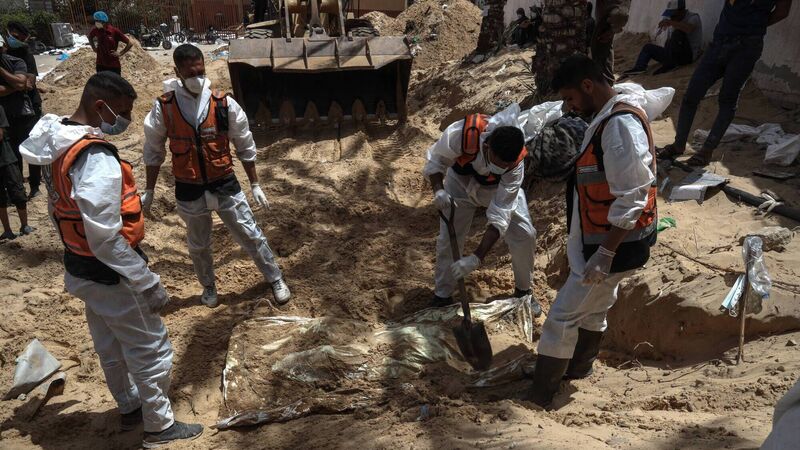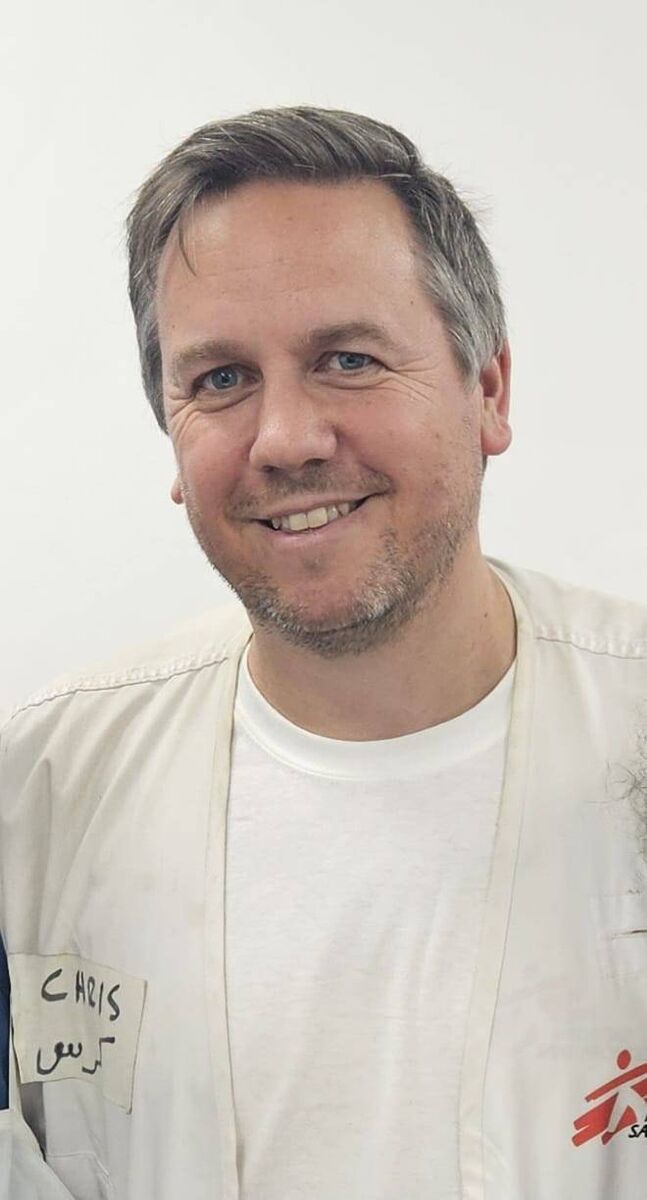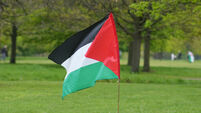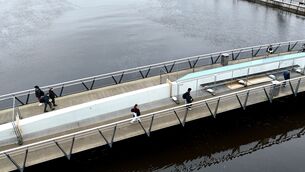Primary care is given ‘in tented facilities’ in Gaza

Health workers unearth bodies found at Nasser Hospital in Khan Yunis in the southern Gaza Strip on April 23, 2024 amid the ongoing conflict between Israel and the Palestinian militant group Hamas. (Photo by AFP) (Photo by -/AFP via Getty Images)
AN EMERGENCY doctor, who is due to speak in Cork next month about his experiences in Gaza, has described the horrific injuries suffered in the war by Palestinian civilians, many of them small children.
Dr Chris Hook, an English doctor who works with Doctors Without Borders, or Médecins Sans Frontières (MSF), was working in Nasser hospital in Gaza earlier this summer, having also worked with MSF in the Palestinian enclave late last year and before that with the Red Cross.
“When there are big mass-casualty events, it’s because people have been exposed to heavy weaponry in a closely confined area within a city, or trapped within a collapsed building, and so you see people with multiple injuries,” he told The Echo.
“As in, big fractures to all limbs, along with burns, along with injuries to the chest and abdomen, these really badly, multiply injured people, often with really big, difficult-to-heal wounds with big pieces of tissue missing from the explosive forces and being hit by debris.”
Many of the people who survive their wounds will have huge ongoing care needs, he said, with many never walking properly again, or walking at all, with many people unable to ever work again.
“And a lot of these are kids,” Dr Hook said. “We’re seeing lots and lots of bad injuries to children, loads of unconscious kids with nasty injuries, nasty burns, fractures.”
Although he is an experienced trauma surgeon, Dr Hook’s voice trailed off as he attempted to recount the injuries inflicted upon small bodies by the violence of war.
“Children’s bodies are a bit more flexible and pliant, so you often see a lot of the energy from these injuries is transmitted through them and they get lung injuries and bowel injuries and it’s just… um… yeah.”
He resumed, with a little difficulty: “When there are explosions, and attacks in heavily populated areas, that’s what you see, [but] at various points that does change.
“We saw, just when I was leaving in December, as fighting gets closer and closer to the population, as the ground forces get closer, you tend to see a few more bullet injuries as people get caught in crossfire.”
Israel’s military campaign has killed more than 40,000 people in Gaza since October according to Palestinian health authorities.
The war in the tiny, crowded enclave began on October 7, 2023, when Hamas gunmen stormed into Israeli communities, murdering around 1,200 people and abducting about 250 hostages, according to Israeli tallies.
All these months of war later, most of Gaza’s hospitals are out of service, having been repeatedly attacked, besieged and raided by the Israeli Defence Forces (IDF), and MSF says patients and medical staff have been killed with sickening regularity.

MSF medical teams have been providing emergency surgeries, wound treatment, medical and maternity care in increasingly difficult circumstances in refugee camps, and in two of Gaza’s main remaining hospitals, Nasser in Khan Younis and Shuhada al-Aqsa in Deir al-Balah.
Dr Hook worked in Nasser hospital in November and December of last year, being forced to leave when IDF attacks came too close to the hospital, eventually overrunning it.
By May and June of this year, the IDF had withdrawn, so MSF medics were able to return, and he was part of the team that helped re-establish orthopaedic surgery and post-operative care for patients there, as well as working in the emergency department there.
“Essentially what we mainly do there is look after people who have been the victims of trauma and burns, and we provide post-operative care to people with injuries to bone, plastic surgery and burn cases,” he said.
“Now we are providing lots of primary care in refugee camp-style tented facilities where people come and get basic medication.”
Many of the people injured in Gaza suffer from extreme burns and major fractures that won’t heal properly and may go on to require amputations, he said.
“Many of these patients, even if they can get back to something resembling normal life, will have severe chronic pain that will require substantial pain management as well.
“It would be a huge burden even on the most functional healthcare system, let alone for a system under intense pressure, like in Gaza.”
Whenever the IDF bombs a hospital in Gaza, it tends to be a standard claim that Hamas is using medical facilities as shields for terrorist activities, or as terrorist command centres.
When asked whether he had seen any evidence to support such claims, Dr Hook said he has been granted complete freedom of movement in every Gazan hospital he has visited and he never seen any sign of military activity within them.
“For sure, we know that [combatants] injured in the war will come to hospital, but their weapons are left elsewhere, and that’s part of humanitarian law, that anyone who is injured will get treated, but I have never seen anything that resembles people hiding within the population, or using a hospitals as a command centre or a base,” he said.
From the first days of this war, MSF has been calling for an immediate ceasefire and greater access for residents to food, medication and healthcare.
Dr Hook has Irish nationality, thanks to a grandfather born in Derry, and he said the best thing Irish people can do is to try and keep the war in Gaza on the political agenda and keep advocating for a ceasefire and better access for humanitarian organisations like MSF.
“We have to try and remain aware that this is still going on and we have to remember that while they might be far away and have different belief systems, these are just regular, normal people, just like us, who are suffering,” he said.
“We have to remember that these are just people like you and I and they just want to raise their kids in safety.”
Dr Chris Hook will speak about his experiences in Gaza at a free public event in Cork on September 5, and he will be joined by MSF worker Jacob Burns, who has also worked in Gaza, and Dr Jennifer Hulse, who recently returned from Darfur, in Sudan.
The people of Sudan have faced horrific levels of violence since the war broke out there in March 2023.
MSF is currently active in eight states in Sudan, providing lifesaving assistance to people affected by the violence, displacement, and disruptions in the health system.
The MSF event ‘Gaza and Sudan: Healthcare on the Frontline’ takes place at the Triskel Arts Centre, Tobin Street, Cork, at 7pm on Thursday, September 5. Registration is required. See MSF.ie, email events@dubin.msf.org, or call 01 6603337.










 App?
App?


